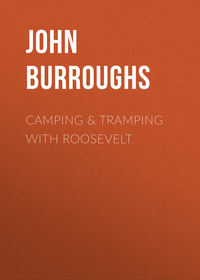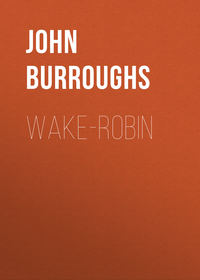 полная версия
полная версияWhitman: A Study
Again he says: "I go among the worst fevers and wounds with impunity; I go among the smallpox, etc., just the same. I feel to go without apprehension, and so I go: nobody else goes; but, as the darkey said there at Charleston when the boat ran on a flat and the rebel sharpshooters were peppering them, 'somebody must jump in de water and shove de boat off.'"
In another letter to his mother he thus accounts for his effect upon the wounded soldiers: "I fancy the reason I am able to do some good in the hospitals among the poor, languishing, and wounded boys, is that I am so large and well, – indeed, like a great wild buffalo with much hair. Many of the soldiers are from the West and far North, and they like a man that has not the bleached, shiny, and shaved cut of the cities and the East."
As to Whitman's appearance about this time, we get an inkling from another letter to his mother, giving an account of an interview he had with Senator Preston King, to whom Whitman applied for assistance in procuring a clerkship in one of the departments. King said to him, "Why, how can I do this thing, or anything for you? How do I know but you are a secessionist? You look for all the world like an old Southern planter, – a regular Carolina or Virginia planter."
The great suffering of the soldiers and their heroic fortitude move him deeply. He says to his mother: "Nothing of ordinary misfortune seems as it used to, and death itself has lost all its terrors; I have seen so many cases in which it was so welcome and such a relief." Again: "I go to the hospitals every day or night. I believe no men ever loved each other as I and some of these poor wounded, sick, and dying men love each other."
Whitman's services in the hospitals began to tell seriously upon his health in June, 1864, when he had "spells of deathly faintness, and had trouble in the head." The doctors told him he must keep away for a while, but he could not. Under date of June 7, 1864, he writes to his mother: —
"There is a very horrible collection in Armory Building (in Armory Square Hospital), – about two hundred of the worst cases you ever saw, and I have probably been too much with them. It is enough to melt the heart of a stone. Over one third of them are amputation cases. Well, mother, poor Oscar Cunningham is gone at last: (he is the 82d Ohio boy, wounded May 3, '63). I have written so much of him I suppose you feel as if you almost knew him. I was with him Saturday forenoon, and also evening. He was more composed than usual; could not articulate very well. He died about two o'clock Sunday morning, very easy, they told me. I was not there. It was a blessed relief. His life has been misery for months. I believe I told you, last letter, I was quite blue from the deaths of several of the poor young men I knew well, especially two of whom I had strong hopes of their getting up. Things are going pretty badly with the wounded. They are crowded here in Washington in immense numbers, and all those that came up from the Wilderness and that region arrived here so neglected and in such plight it was awful (those that were at Fredericksburg, and also from Belle Plain). The papers are full of puffs, etc., but the truth is the largest proportion of worst cases get little or no attention.
"We receive them here with their wounds full of worms, – some all swelled and inflamed. Many of the amputations have to be done over again. One new feature is, that many of the poor, afflicted young men are crazy; every ward has some in it that are wandering. They have suffered too much, and it is perhaps a privilege that they are out of their senses. Mother, it is most too much for a fellow, and I sometimes wish I was out of it; but I suppose it is because I have not felt firstrate myself."
Of the Ohio soldier above referred to, Whitman had written a few days before: "You remember I told you of him a year ago, when he was first brought in. I thought him the noblest specimen of a young Western man I had seen. A real giant in size, and always with a smile on his face. Oh, what a change! He has long been very irritable to every one but me, and his frame is all wasted away."
To his brother Jeff he wrote: "Of the many I have seen die, or known of the past year, I have not seen or known of one who met death with any terror. Yesterday I spent a good part of the afternoon with a young man of seventeen named Charles Cutter, of Lawrence City, 1st Massachusetts Heavy Artillery, Battery M. He was brought into one of the hospitals mortally wounded in abdomen. Well, I thought to myself as I sat looking at him, it ought to be a relief to his folks, after all, if they could see how little he suffered. He lay very placid, in a half lethargy, with his eyes closed; it was very warm, and I sat a long while fanning him and wiping the sweat. At length he opened his eyes quite wide and clear, and looked inquiringly around. I said, "What is it, my dear? do you want anything?" He said quietly, with a good-natured smile, "Oh, nothing; I was only looking around to see who was with me." His mind was somewhat wandering, yet he lay so peaceful in his dying condition. He seemed to be a real New England country boy, so good-natured, with a pleasant, homely way, and quite fine-looking. Without any doubt, he died in course of the night."
Another extract from a letter to his mother in April, 1864: —
"Mother, you don't know what a feeling a man gets after being in the active sights and influences of the camp, the army, the wounded, etc. He gets to have a deep feeling he never experienced before, – the flag, the tune of Yankee Doodle, and similar things, produce an effect on a fellow never felt before. I have seen tears on the men's cheeks, and others turn pale under such circumstances. I have a little flag, – it belonged to one of our cavalry regiments, – presented to me by one of the wounded. It was taken by the rebs in a cavalry fight, and rescued by our men in a bloody little skirmish. It cost three men's lives just to get one little flag four by three. Our men rescued it, and tore it from the breast of a dead rebel. All that just for the name of getting their little banner back again. The man that got it was very badly wounded, and they let him keep it. I was with him a good deal. He wanted to give me something, he said; he did not expect to live; so he gave me the little banner as a keepsake. I mention this, mother, to show you a specimen of the feeling. There isn't a regiment of cavalry or infantry that wouldn't do the same on occasion."
[An army surgeon, who at the time watched with curiosity Mr. Whitman's movements among the soldiers in the hospitals, has since told me that his principles of operation, effective as they were, seemed strangely few, simple, and on a low key, – to act upon the appetite, to cheer by a healthy and fitly bracing appearance and demeanor; and to fill and satisfy in certain cases the affectional longings of the patients, was about all. He carried among them no sentimentalism nor moralizing; spoke not to any man of his "sins," but gave something good to eat, a buoying word, or a trifling gift and a look. He appeared with ruddy face, clean dress, with a flower or a green sprig in the lapel of his coat. Crossing the fields in summer, he would gather a great bunch of dandelion blossoms, and red and white clover, to bring and scatter on the cots, as reminders of out-door air and sunshine.
When practicable, he came to the long and crowded wards of the maimed, the feeble, and the dying, only after preparations as for a festival, – strengthened by a good meal, rest, the bath, and fresh underclothes. He entered with a huge haversack slung over his shoulder, full of appropriate articles, with parcels under his arms, and protuberant pockets. He would sometimes come in summer with a good-sized basket filled with oranges, and would go round for hours paring and dividing them among the feverish and thirsty.]
Of his devotion to the wounded soldiers there are many witnesses. A well-known correspondent of the "New York Herald" writes thus about him in April, 1876: —
"I first heard of him among the sufferers on the Peninsula after a battle there. Subsequently I saw him, time and again, in the Washington hospitals, or wending his way there, with basket or haversack on his arm, and the strength of beneficence suffusing his face. His devotion surpassed the devotion of woman. It would take a volume to tell of his kindness, tenderness, and thoughtfulness.
"Never shall I forget one night when I accompanied him on his rounds through a hospital filled with those wounded young Americans whose heroism he has sung in deathless numbers. There were three rows of cots, and each cot bore its man. When he appeared, in passing along, there was a smile of affection and welcome on every face, however wan, and his presence seemed to light up the place as it might be lighted by the presence of the God of Love. From cot to cot they called him, often in tremulous tones or in whispers; they embraced him; they touched his hand; they gazed at him. To one he gave a few words of cheer; for another he wrote a letter home; to others he gave an orange, a few comfits, a cigar, a pipe and tobacco, a sheet of paper or a postage-stamp, all of which and many other things were in his capacious haversack. From another he would receive a dying message for mother, wife, or sweetheart; for another he would promise to go an errand; to another, some special friend very low, he would give a manly farewell kiss. He did the things for them no nurse or doctor could do, and he seemed to leave a benediction at every cot as he passed along. The lights had gleamed for hours in the hospital that night before he left it, and, as he took his way towards the door, you could hear the voices of many a stricken hero calling, 'Walt, Walt, Walt! come again! come again!'"
IIIOut of that experience in camp and hospital the pieces called "Drum-Taps," first published in 1865, – since merged in his "Leaves," – were produced. Their descriptions and pictures, therefore, come from life. The vivid incidents of "The Dresser" are but daguerreotypes of the poet's own actual movements among the bad cases of the wounded after a battle. The same personal knowledge runs through "A Sight in Camp in the Daybreak Gray and Dim," "Come up from the Fields, Father," etc., etc.
The reader of this section of Whitman's work soon discovers that it is not the purpose of the poet to portray battles and campaigns, or to celebrate special leaders or military prowess, but rather to chant the human aspects of anguish that follow in the train of war. He perhaps feels that the permanent condition of modern society is that of peace; that war as a business, as a means of growth, has served its time; and that, notwithstanding the vast difference between ancient and modern warfare, both in the spirit and in the means, Homer's pictures are essentially true yet, and no additions to them can be made. War can never be to us what it has been to the nations of all ages down to the present; never the main fact, the paramount condition, tyrannizing over all the affairs of national and individual life, but only an episode, a passing interruption; and the poet, who in our day would be as true to his nation and times as Homer was to his, must treat of it from the standpoint of peace and progress, and even benevolence. Vast armies rise up in a night and disappear in a day; a million of men, inured to battle and to blood, go back to the avocations of peace without a moment's confusion or delay, – indicating clearly the tendency that prevails.
Apostrophizing the genius of America in the supreme hour of victory, he says: —
"No poem proud, I, chanting, bring to thee – nor mastery's rapturous verse: —But a little book containing night's darkness and blood-dripping wounds,And psalms of the dead."The collection is also remarkable for the absence of all sectional or partisan feeling. Under the head of "Reconciliation" are these lines: —
"Word over all, beautiful as the sky!Beautiful that war, and all its deeds of carnage, must in time be utterly lost!That the hands of the sisters Death and Night incessantly, softly wash again, and ever again, this soil'd world;… For my enemy is dead – a man divine as myself is dead;I look where he lies, white-faced and still, in the coffin – I draw near;I bend down, and touch lightly with my lips the white face in the coffin."Perhaps the most noteworthy of Whitman's war poems is the one called "When Lilacs last in the Door-yard bloomed," written in commemoration of President Lincoln.
The main effect of this poem is of strong, solemn, and varied music; and it involves in its construction a principle after which perhaps the great composers most work, – namely, spiritual auricular analogy. At first it would seem to defy analysis, so rapt is it, and so indirect. No reference whatever is made to the mere fact of Lincoln's death; the poet does not even dwell upon its unprovoked atrocity, and only occasionally is the tone that of lamentation; but, with the intuitions of the grand art, which is the most complex when it seems most simple, he seizes upon three beautiful facts of nature, which he weaves into a wreath for the dead President's tomb. The central thought is of death, but around this he curiously twines, first, the early-blooming lilacs which the poet may have plucked the day the dark shadow came; next the song of the hermit thrush, the most sweet and solemn of all our songsters, heard at twilight in the dusky cedars; and with these the evening star, which, as many may remember, night after night in the early part of that eventful spring, hung low in the west with unusual and tender brightness. These are the premises whence he starts his solemn chant.
The attitude, therefore, is not that of being bowed down and weeping hopeless tears, but of singing a commemorative hymn, in which the voices of nature join, and fits that exalted condition of the soul which serious events and the presence of death induce. There are no words of mere eulogy, no statistics, and no story or narrative; but there are pictures, processions, and a strange mingling of darkness and light, of grief and triumph: now the voice of the bird, or the drooping lustrous star, or the sombre thought of death; then a recurrence to the open scenery of the land as it lay in the April light, "the summer approaching with richness and the fields all busy with labor," presently dashed in upon by a spectral vision of armies with torn and bloody battle-flags, and, again, of the white skeletons of young men long afterward strewing the ground. Hence the piece has little or nothing of the character of the usual productions on such occasions. It is dramatic; yet there is no development of plot, but a constant interplay, a turning and returning of images and sentiments.
The poet breaks a sprig of lilac from the bush in the door-yard, – the dark cloud falls on the land, – the long funeral sets out, – and then the apostrophe: —
"Coffin that passes through lanes and streets,Through day and night, with the great cloud darkening the land,With the pomp of the inloop'd flags, with the cities draped in black,With the show of the States themselves, as of crape-veiled women, standing,With processions long and winding, and the flambeaus of the night,With the countless torches lit – with the silent sea of faces, and the unbared heads,With the waiting depot, the arriving coffin, and the sombre faces,With dirges through the night, with the thousand voices rising strong and solemn;With all the mournful voices of the dirges, pour'd around the coffin,To dim-lit churches and the shuddering organs – Where amid these you journey,With the tolling, tolling bells' perpetual clang;Here! coffin that slowly passes,I give you my sprig of lilac."(Nor for you, for one alone;Blossoms and branches green to coffins all I bring;For fresh as the morning – thus would I chant a song for you, O sane and sacred death."All over bouquets of roses,O death! I cover you over with roses and early lilies;But mostly and now the lilac that blooms the first,Copious, I break, I break the sprigs from the bushes;With loaded arms I come, pouring for you,For you and the coffins all of you, O death.)"Then the strain goes on: —
"O how shall I warble myself for the dead one there I loved?And how shall I deck my song for the large sweet soul that has gone?And what shall my perfume be, for the grave of him I love?"Sea-winds, blown from east and west,Blown from the eastern sea, and blown from the western sea, till there on the prairies meeting:These, and with these, and the breath of my chant,I perfume the grave of him I love."The poem reaches, perhaps, its height in the matchless invocation to Death: —
"Come, lovely and soothing Death,Undulate round the world, serenely arriving, arriving,In the day, in the night, to all, to each,Sooner or later, delicate Death."Prais'd be the fathomless universe,For life and joy, and for objects and knowledge curious;And for love, sweet love – but praise! O praise and praise,For the sure-enwinding arms of cool-enfolding Death."Dark Mother, always gliding near, with soft feet,Have none chanted for thee a chant of fullest welcome?Then I chant it for thee – I glorify thee above all;I bring thee a song that when thou must indeed come, come unfalteringly."Approach, encompassing Death – strong Deliveress!When it is so – when thou hast taken them, I joyously sing the dead,Lost in the loving, floating ocean of thee,Laved in the flood of thy bliss, O Death."From me to thee glad serenades,Dances for thee I propose, saluting thee – adornments and feastings for thee;And the sights of the open landscape, and the high-spread sky are fitting,And life and the fields, and the huge and thoughtful night.The night, in silence, under many a star;The ocean shore, and the husky whispering wave, whose voice I know;And the soul turning to thee, O vast and well-veil'd Death,And the body gratefully nestling close to thee."IVWhitman despised riches, and all mere worldly success, as heartily as ever did any of the old Christians. All outward show and finery were intensely distasteful to him. He probably would not have accepted the finest house in New York on condition that he live in it. During his hospital experiences he cherished the purpose, as soon as the war was over, of returning to Brooklyn, buying an acre or two of land in some by-place on Long Island, and building for himself and his family a cheap house. When his brother Jeff contemplated building, he advised him to build merely an Irish shanty. After what he had seen the soldiers put up with, he thought anything was good enough for him or his people. In one of his letters to his mother, he comments upon the un-American and inappropriate ornamentation of the rooms in the Capitol building, "without grandeur and without simplicity," he says. In the state the country was in, and with the hospital scenes before him, the "poppy-show goddesses" and the Italian style of decoration, etc., sickened him, and he got away from it all as quickly as he could.
VDuring the war and after, I used to see a good deal of Whitman in Washington. Summer and winter he was a conspicuous figure on Pennsylvania Avenue, where he was wont to walk for exercise and to feed his hunger for faces. One would see him afar off, in the crowd but not of it, – a large, slow-moving figure, clad in gray, with broad-brimmed hat and gray beard, – or, quite as frequently, on the front platform of the street horse-cars with the driver. My eye used to single him out many blocks away.
There were times during this period when his aspect was rather forbidding, – the physical man was too pronounced on first glance; the other man was hidden beneath the broad-brimmed hat. One needed to see the superbly domed head and classic brow crowning the rank physical man.
In his middle manhood, judging from the photos, he had a hirsute, kindly look, but very far removed from the finely cut traditional poet's face.
VII have often heard Whitman say that he inherited most excellent blood from his mother, – the old Dutch Van Velser strain, – Long Island blood filtered and vitalized through generations by the breath of the sea. He was his mother's child unmistakably. With all his rank masculinity, there was a curious feminine undertone in him which revealed itself in the quality of his voice, the delicate texture of his skin, the gentleness of his touch and ways, the attraction he had for children and the common people. A lady in the West, writing to me about him, spoke of his "great mother-nature." He was receptive, sympathetic, tender, and met you, not in a positive, aggressive manner, but more or less in a passive or neutral mood. He did not give his friends merely his mind, he gave them himself. It is not merely his mind or intellect that he has put into his poems, it is himself. Indeed, this feminine mood or attitude might be dwelt upon at much length in considering his poems, – their solvent, absorbing power, and the way they yield themselves to diverse interpretations.
The sea, too, had laid its hand upon him, as I have already suggested. He never appeared so striking and impressive as when seen upon the beach. His large and tall gray figure looked at home, and was at home, upon the shore. The simple, strong, flowing lines of his face, his always clean fresh air, his blue absorbing eye, his commanding presence, and something pristine and elemental in his whole expression, seemed at once to put him en rapport with the sea. No phase of nature seems to have impressed him so deeply as the sea, or recurs so often in his poems.
VIIWhitman was preëminently manly, – richly endowed with the universal, healthy human qualities and attributes. Mr. Conway relates that when Emerson handed him the first thin quarto edition of "Leaves of Grass," while he was calling at his house in Concord, soon after the book appeared, he said, "Americans abroad may now come home: unto us a man is born."
President Lincoln, standing one day during the war before a window in the White House, saw Whitman slowly saunter by. He followed him with his eyes, and, turning, said to those about him, "Well, he looks like a man."
"Meeter of savage and gentleman on equal terms."During Whitman's Western tour in 1879 or '80, at some point in Kansas, in company with several well-known politicians and government officials, he visited a lot of Indians who were being held as prisoners. The sheriff told the Indians who the distinguished men were who were about to see them, but the Indians paid little attention to them as, one after the other, the officials and editors passed by them. Behind all came Whitman. The old chief looked at him steadily, then extended his hand and said, "How!" All the other Indians followed, surrounding Whitman, shaking his hand and making the air melodious with their "Hows." The incident evidently pleased the old poet a good deal.
VIIIWhitman was of large mould in every way, and of bold, far-reaching schemes, and is very sure to fare better at the hands of large men than of small. The first and last impression which his personal presence always made upon one was of a nature wonderfully gentle, tender, and benignant. His culture, his intellect, was completely suffused and dominated by his humanity, so that the impression you got from him was not that of a learned or a literary person, but of fresh, strong, sympathetic human nature, – such an impression, I fancy, only fuller, as one might have got from Walter Scott. This was perhaps the secret of the attraction he had, for the common, unlettered people and for children. I think that even his literary friends often sought his presence less for conversation than to bask in his physical or psychical sunshine, and to rest upon his boundless charity. The great service he rendered to the wounded and homesick soldiers in the hospitals during the war came from his copious endowment of this broad, sweet, tender democratic nature. He brought father and mother to them, and the tonic and cheering atmosphere of simple, affectionate home life.
In person Whitman was large and tall, above six feet, with a breezy, open-air look. His temperament was sanguine; his voice was a tender baritone. The dominant impression he made was that of something fresh and clean. I remember the first time I met him, which was in Washington, in the fall of 1863. I was impressed by the fine grain and clean, fresh quality of the man. Some passages in his poems had led me to expect something different. He always had the look of a man who had just taken a bath. The skin was light and clear, and the blood well to the surface. His body, as I once noticed when we were bathing in the surf, had a peculiar fresh bloom and fineness and delicacy of texture. His physiology was undoubtedly remarkable, unique. The full beauty of his face and head did not appear till he was past sixty. After that, I have little doubt, it was the finest head this age or country has seen. Every artist who saw him was instantly filled with a keen desire to sketch him. The lines were so simple, so free, and so strong. High, arching brows; straight, clear-cut nose; heavy-lidded blue-gray eyes; forehead not thrust out and emphasized, but a vital part of a symmetrical, dome-shaped head; ear large, and the most delicately carved I have ever seen; the mouth and chin hidden by a soft, long, white beard. It seems to me his face steadily refined and strengthened with age. Time depleted him in just the right way, – softened his beard and took away the too florid look; subdued the carnal man, and brought out more fully the spiritual man. When I last saw him (December 26, 1891), though he had been very near death for many days, I am sure I had never seen his face so beautiful. There was no breaking-down of the features, or the least sign of decrepitude, such as we usually note in old men. The expression was full of pathos, but it was as grand as that of a god. I could not think of him as near death, he looked so unconquered.









